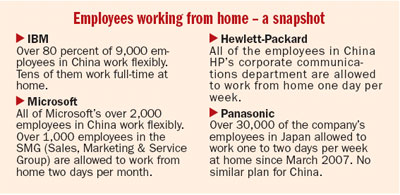Home work
By Wang Xing (China Daily)Updated: 2007-06-25 09:29
Cost-cutting
Although the trend toward home working is undeniably fueled by technology and employee demand, proactive employer initiative driven by business needs is equally important.
Brian Prentice, research director of Gartner who is responsible for emerging trends and technologies research, said the cost of real estate and growing traffic worries are the main driving forces behind the trend of more people opting to work from home, and more companies obliging them.
"If you can reduce the size of your office space through things like 'hoteling', it's a direct cost saving," he says. "And if you can expand into new geographies without incurring excessive facilities cost, that's also a great opportunity."
In fact, as a new way of cost-cutting, many companies have begun to see the work-from-home model as a secret weapon in the fierce labor market competition. Hewlett-Packard, for example, plans to shut down nine local offices in China by the end of this year. All employees of these offices will be ordered to work at home full-time, with necessary equipment such as laptops and printers provided by the company."
"Although we will eliminate nine offices in China, we plan to penetrate into 50 to 100 new cities in the country this year," says Maggie Gu, Senior PR manager of China HP Corporate Communications. "The success of the plan relies heavily on our ability to encourage local employees to work at home. The money saved on office maintenance will be invested in marketing campaigns."
With similar cost-cutting practices around the world, HP has saved some $200 million from its office operation, or 0.2 percent of the company's annual revenue in 2006. Its target is to cut costs by another $200 million each year until 2008.
A long way to go 
Although working from home is a clear future trend, the fact is, it does have its pros and cons. Those who take this route do gain some freedom in terms of work time make certain sacrifices such as potential promotion opportunities, and run the risk of an estrangement that comes with the physical distance between them and their bosses.
Tim Dwelly and Yvonne Bennion from Work Foundation, a not-for-profit organization, said in a report titled "Time to go home" in 2003 that effective home working requires a true partnership between the employer and the employee.
"Home working requires employees' contributions to be measured by their output rather than by the number of hours they spend at work," the report said. "But most companies have not started to review attitudes to output versus hours ... The assumption is that if the work is completed before time, there must be another task to be done."
Gartner's Prentice also says the "supervisor" mindset of many managers could be a real hurdle to future home working. "A major issue is that managements need to learn how to manage people without physical proximity."
Yvonne Wang, senior human resources manager of Microsoft China, contends that working from home has a greater symbolic meaning than its real impact. "Our employees feel more comfortable in the knowledge that they have the right to work at home if there is a need," she says. "But that won't see an instant flood of people wanting to work from home."
Although it's happening, working from home is far from becoming an established model in China. But experts say that as competition in cost saving and staffing gets stiffer, more major companies will begin to take home working more seriously.
"Our office in Shanghai will move away from the city center later this month. I think it could be a good chance to further promote our flexible work program," says IBM's Liang.
(China Daily 06/25/2007 page1)
 | 1 | 2 |
(For more biz stories, please visit Industry Updates)